Nigeria: Five suicide bombings kill 34, most of them at mosque
Nigeria: Five suicide bombings kill 34, most of them at mosque
22 photos: Boko Haram: Nigeria's crisis
Hide Caption
12 of 22
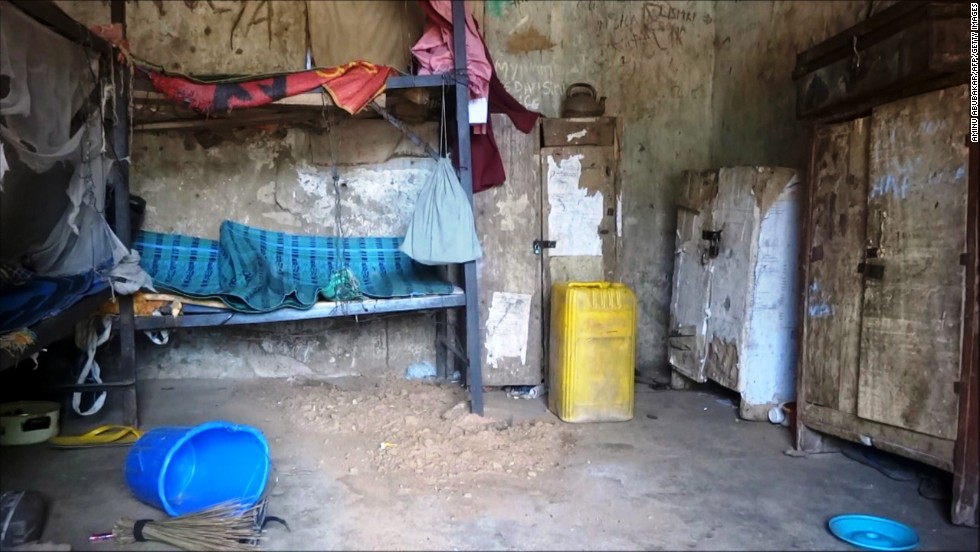
22 photos: Boko Haram: Nigeria's crisis
A deserted student hostel is shown on August 6, 2013, after gunmen stormed a school in Yobe state, killing 20 students and a teacher, state media reported.
Hide Caption
13 of 22
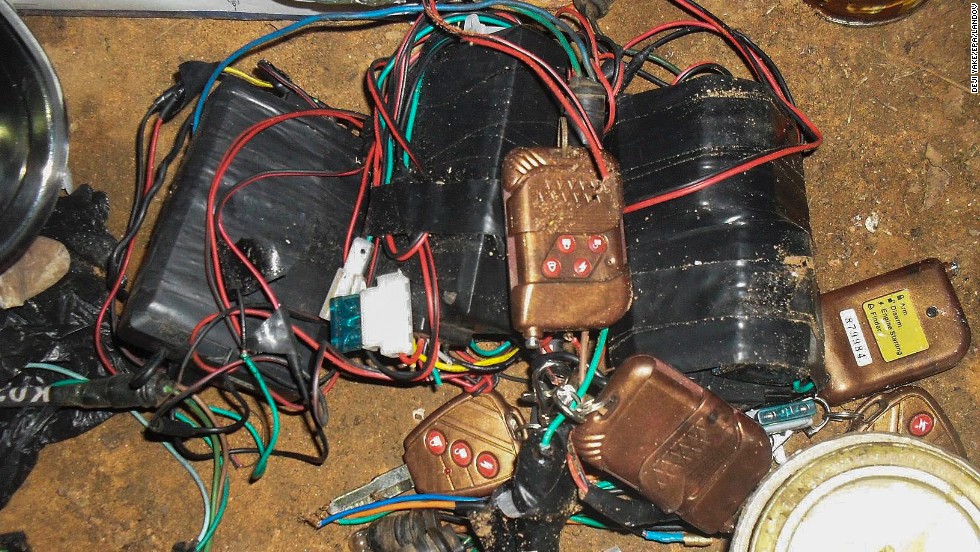
22 photos: Boko Haram: Nigeria's crisis
A photograph made available by the Nigerian army on August 13, 2013, shows improvised explosive devices, bomb-making materials and detonators seized from a Boko Haram hideout. Gunmen attacked a mosque in Nigeria with automatic weapons on August 11, 2013, killing at least 44 people.
Hide Caption
14 of 22
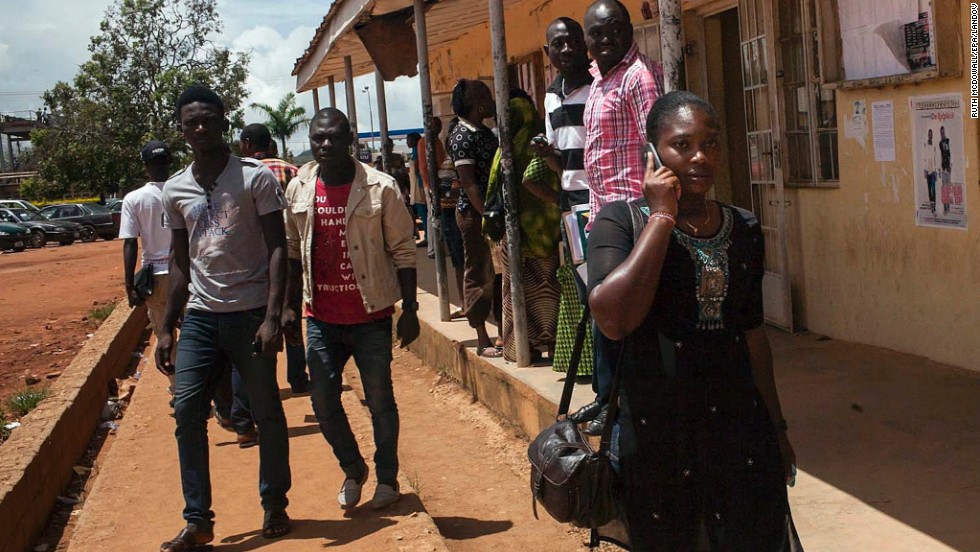
22 photos: Boko Haram: Nigeria's crisis
Nigerian students from Jos Polytechnic walk on campus in Jos, Nigeria, on September 30, 2013. Under the cover of darkness, gunmen approached a college dormitory in a rural Nigerian town and opened fire on students who were sleeping. At least 40 students died, according to the News Agency of Nigeria.
Hide Caption
15 of 22
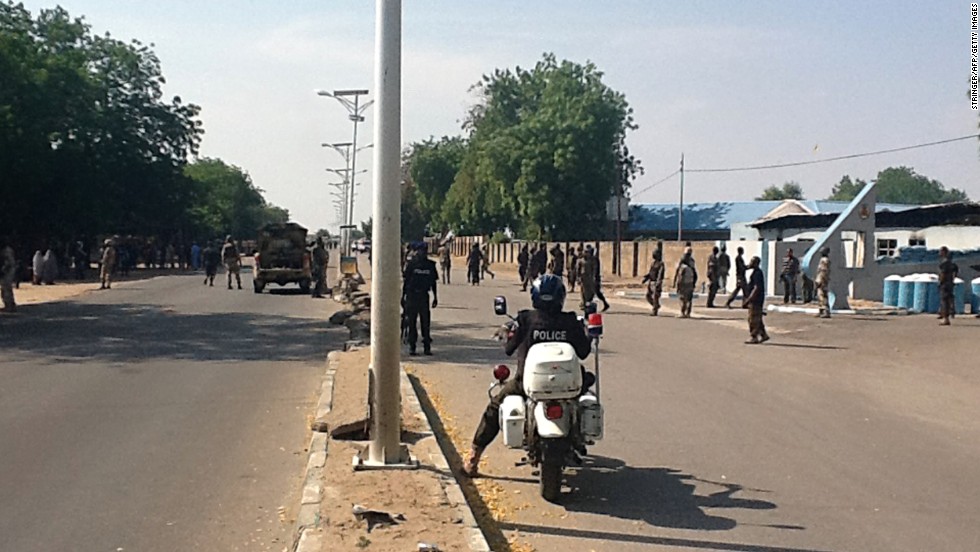
22 photos: Boko Haram: Nigeria's crisis
Soldiers stand outside the 79 Composite Group Air Force base that was attacked earlier in Maiduguri on December 2, 2013. Hundreds of Boko Haram militants attacked an Air Force base and a military checkpoint, according to government officials.
Hide Caption
16 of 22
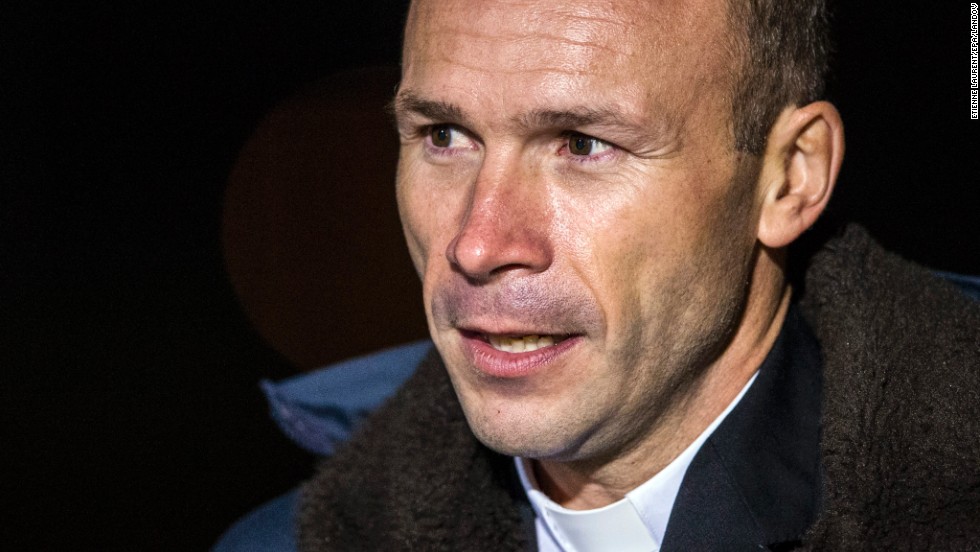
22 photos: Boko Haram: Nigeria's crisis
Catholic priest Georges Vandenbeusch speaks to reporters outside Paris after his release on January 1, 2014. Vandenbeusch was snatched from his parish church in Cameroon on November 13. Boko Haram claimed responsibility for kidnapping the priest.
Hide Caption
17 of 22
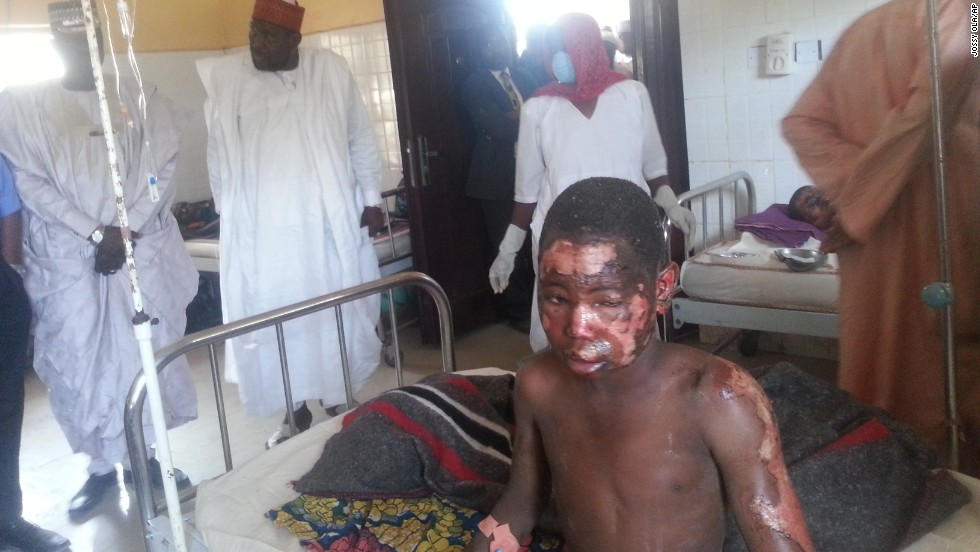
22 photos: Boko Haram: Nigeria's crisis
A man receives treatment at Konduga specialist hospital after a gruesome attack on January 26, 2014. It was suspected that Boko Haram militants opened fire on a village market and torched homes in the village of Kawuri, killing at least 45 people.
Hide Caption
18 of 22
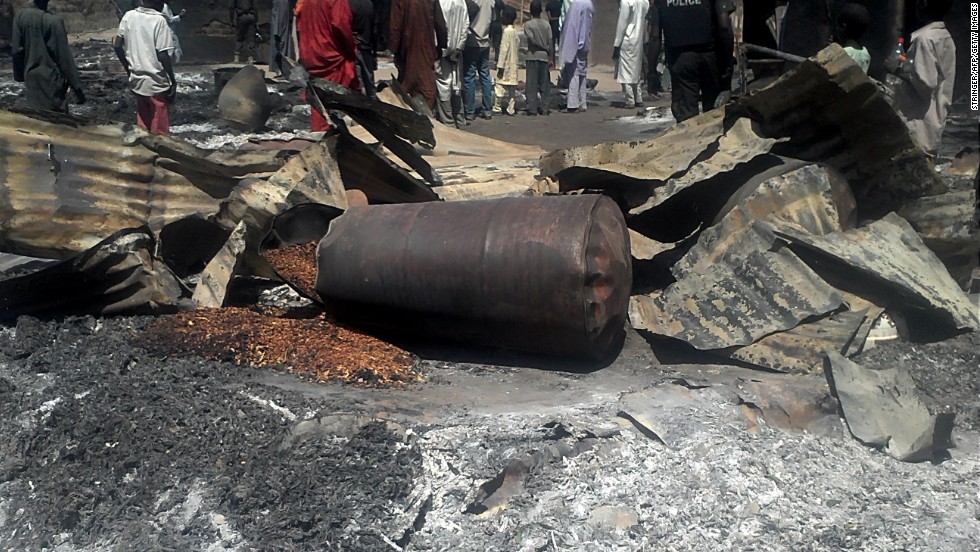
22 photos: Boko Haram: Nigeria's crisis
Police officers stand guard in front of the burned remains of homes and businesses in the village of Konduga on February 12, 2014. Suspected Boko Haram militants torched houses in the village, killing at least 23 people, according to the governor of Borno state on February 11.
Hide Caption
19 of 22
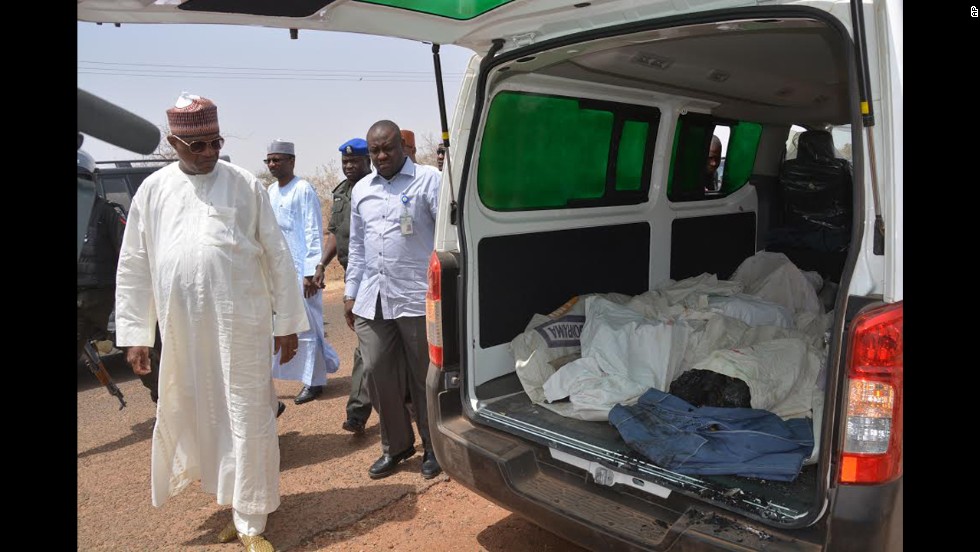
22 photos: Boko Haram: Nigeria's crisis
Yobe state Gov. Ibrahim Gaidam, left, looks at the bodies of students inside an ambulance outside a mosque in Damaturu. At least 29 students died in an attack on a federal college in Buni Yadi, near the capital of Yobe state, Nigeria's military said on February 26, 2014. Authorities suspect Boko Haram carried out the assault in which several buildings were also torched.
Hide Caption
20 of 22
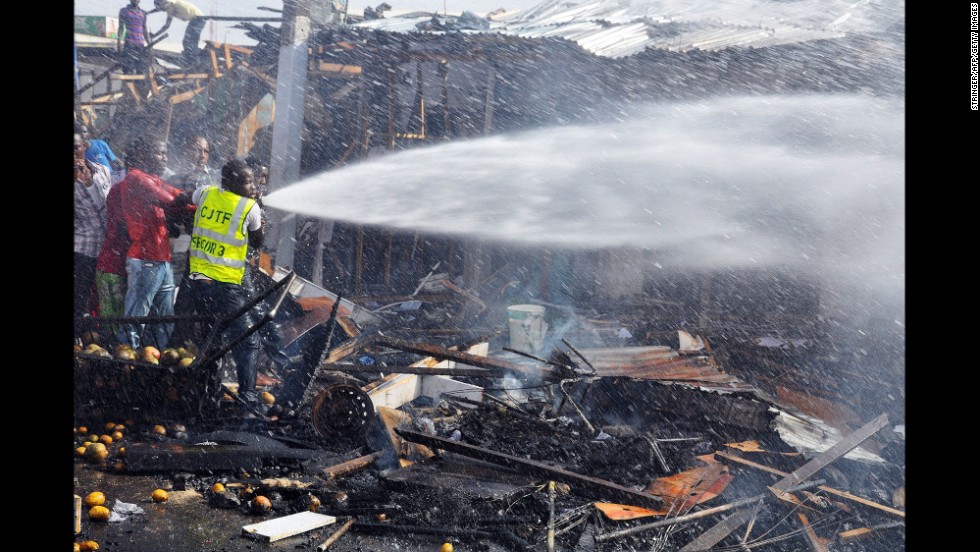
22 photos: Boko Haram: Nigeria's crisis
Rescue workers try to put out a fire after a bomb exploded at the busiest roundabout near the crowded Monday Market in Maiduguri on July 1, 2014.
Hide Caption
21 of 22
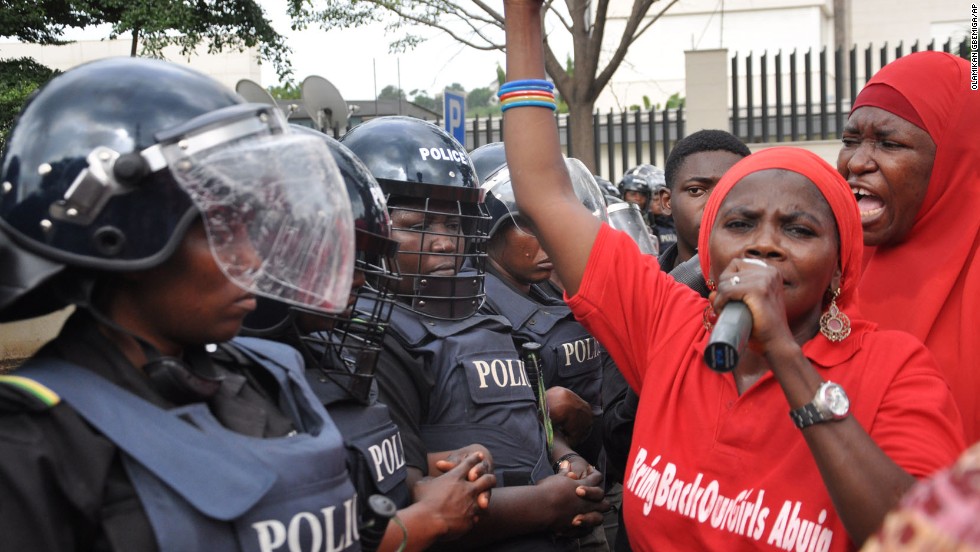
22 photos: Boko Haram: Nigeria's crisis
Police in riot gear block a route in Abuja on October 14, 2014, during a demonstration calling on the Nigerian government to rescue schoolgirls kidnapped by Boko Haram. In April, more than 200 girls were abducted from their boarding school in northeastern Nigeria, officials and witnesses said.
Hide Caption
22 of 22
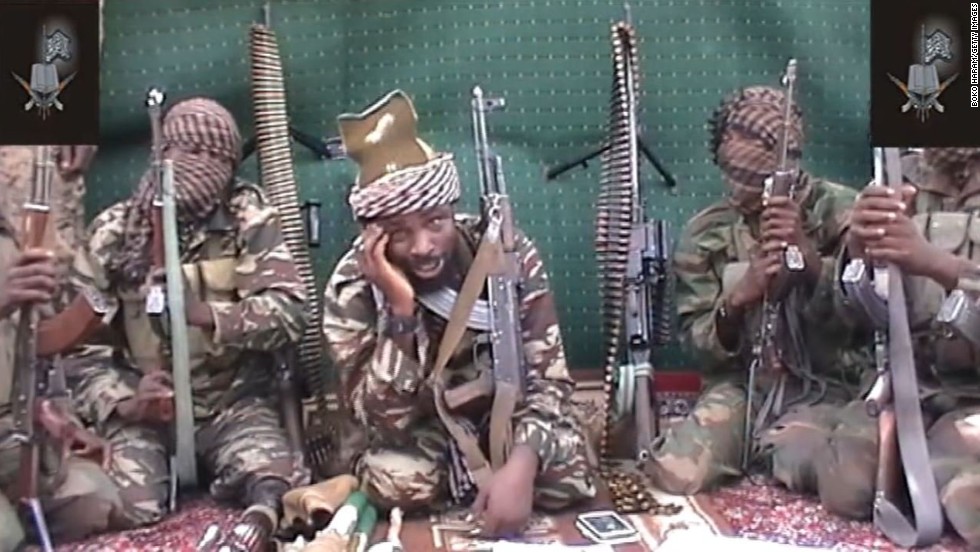
22 photos: Boko Haram: Nigeria's crisis
A video of Abubakar Shekau, who claims to be the leader of the Nigerian Islamist extremist group Boko Haram, is shown in September 2013. Boko Haram is an Islamist militant group waging a campaign of violencein northern Nigeria. The group's ambitions range from the stricter enforcement of Sharia law to the total destruction of the Nigerian state and its government. Click through to see recent bloody incidents in this strife-torn West African nation:
Hide Caption
1 of 22
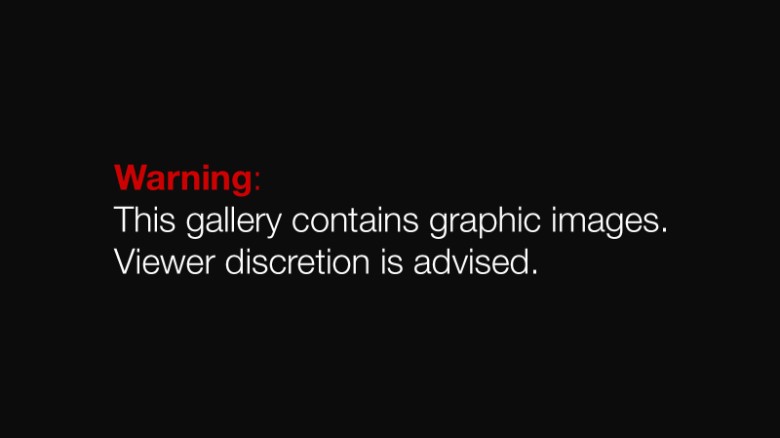
22 photos: Boko Haram: Nigeria's crisis
Hide Caption
2 of 22
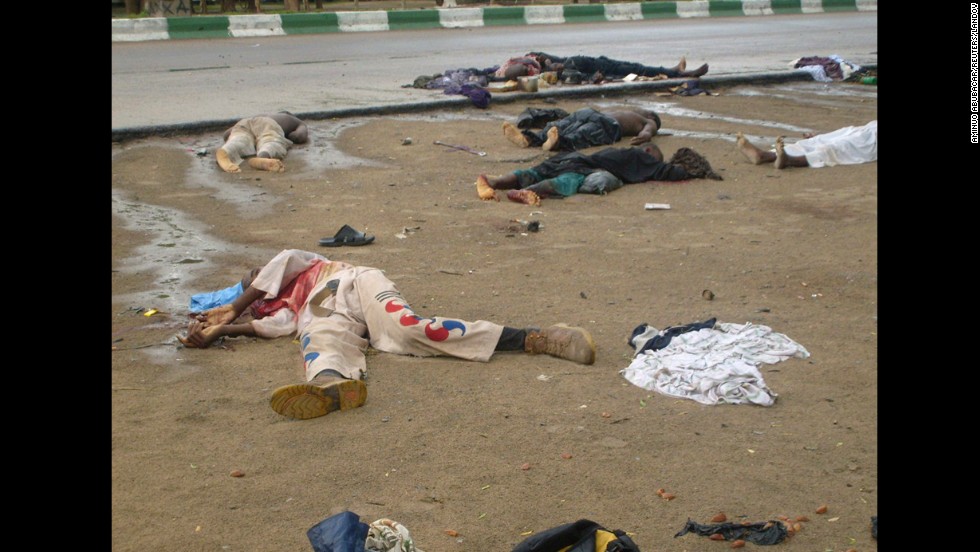
22 photos: Boko Haram: Nigeria's crisis
Bodies lie in the streets in Maiduguri, Nigeria, after religious clashes on July 31, 2009. Boko Haram exploded onto the national scene in 2009 when 700 people were killed in widespread clashes across the north between the group and the Nigerian military.
Hide Caption
3 of 22
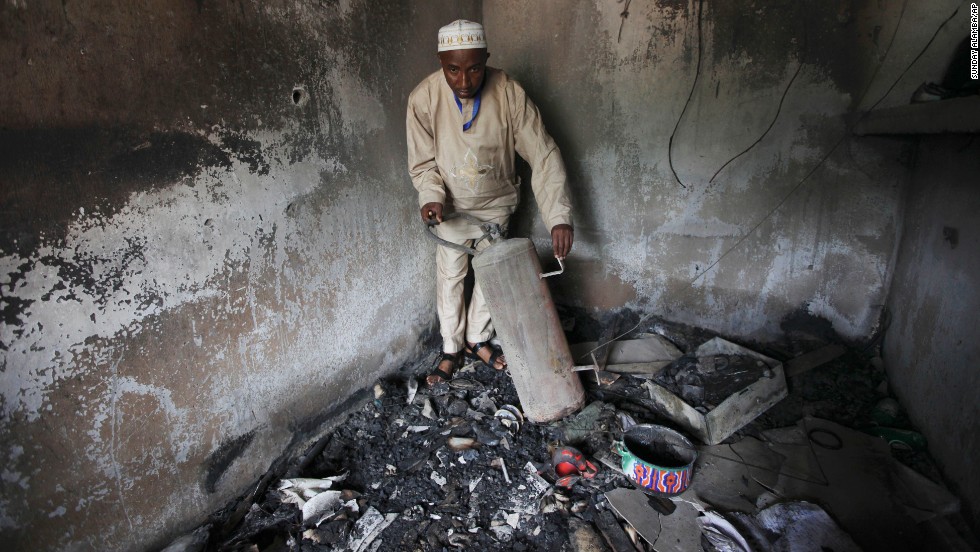
22 photos: Boko Haram: Nigeria's crisis
An official displays burned equipment inside a prison in Bauchi, Nigeria, on September 9, 2010, after the prison was attacked by suspected members of Boko Haram two days earlier. About 720 inmates escaped during the prison break, and police suspect the prison was attacked because it was holding 80 members of the sect.
Hide Caption
4 of 22
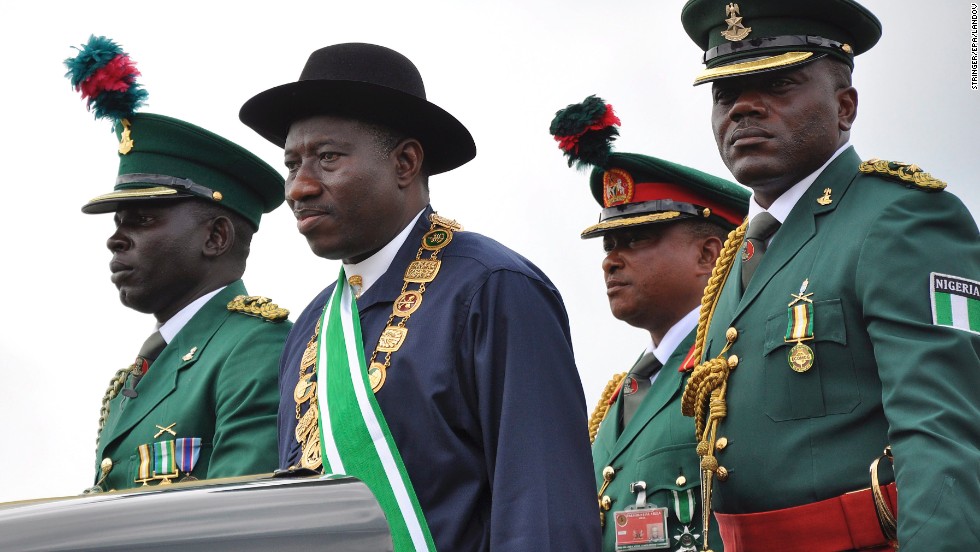
22 photos: Boko Haram: Nigeria's crisis
Nigerian President Goodluck Jonathan, second from left, stands on the back of a vehicle after being sworn-in as President during a ceremony in the capital of Abuja on May 29, 2011. In December 2011, Jonathan declared a state of emergency in parts of the country afflicted by violence from Boko Haram.
Hide Caption
5 of 22
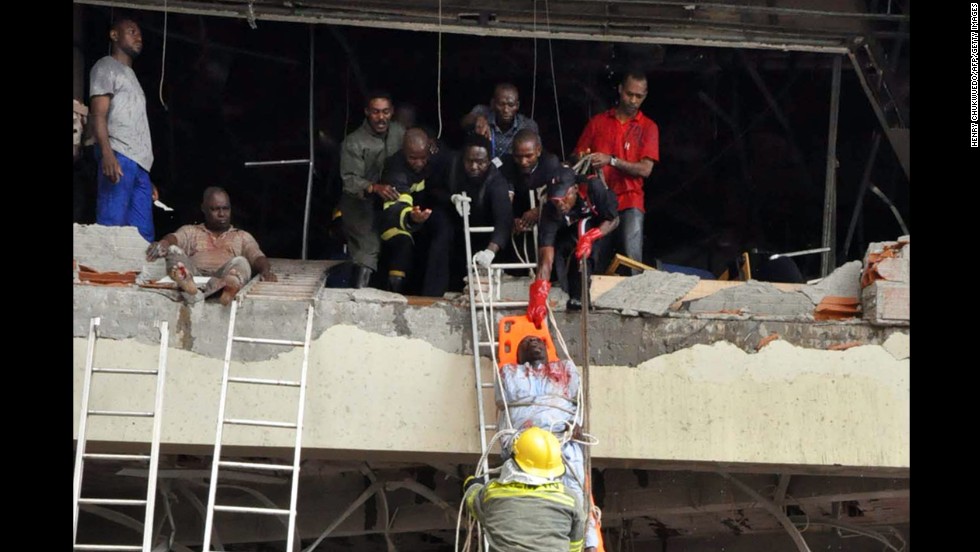
22 photos: Boko Haram: Nigeria's crisis
Rescue workers help a wounded person from a U.N. building in Abuja, Nigeria, on August 26, 2011. The building was rocked by a bomb that killed at least 23 people, leaving others trapped and causing heavy damage. Boko Haram had claimed responsibility for the attack in which a Honda packed with explosivesrammed into the U.N. building, shattering windows and setting the place afire.
Hide Caption
6 of 22
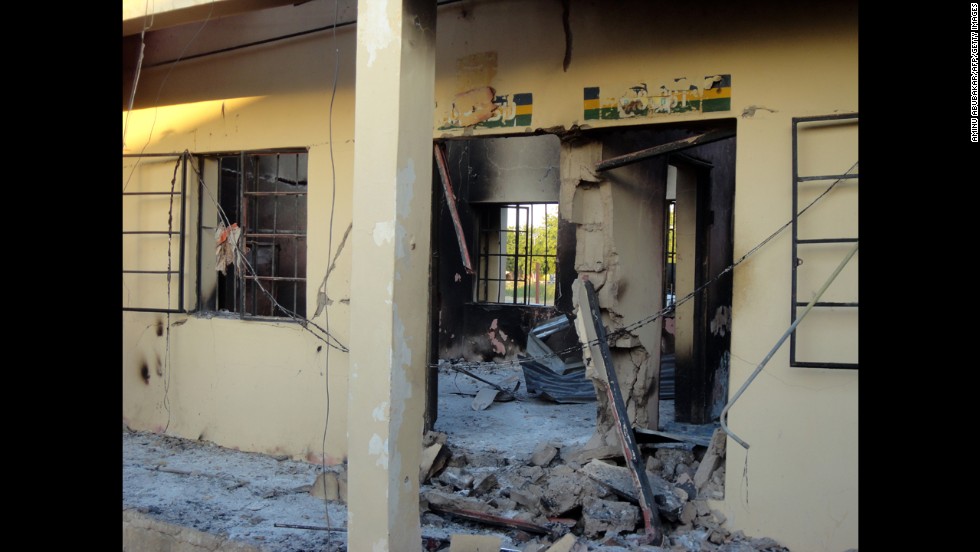
22 photos: Boko Haram: Nigeria's crisis
A photo taken on November 6, 2011, shows state police headquarters burned by a series of attacks that targeted police stations, mosques and churches in Damaturu, Nigeria, on November 4, 2011. Attackers left scores injured -- probably more than 100 -- in a three-hour rampage, and 63 people died.
Hide Caption
7 of 22
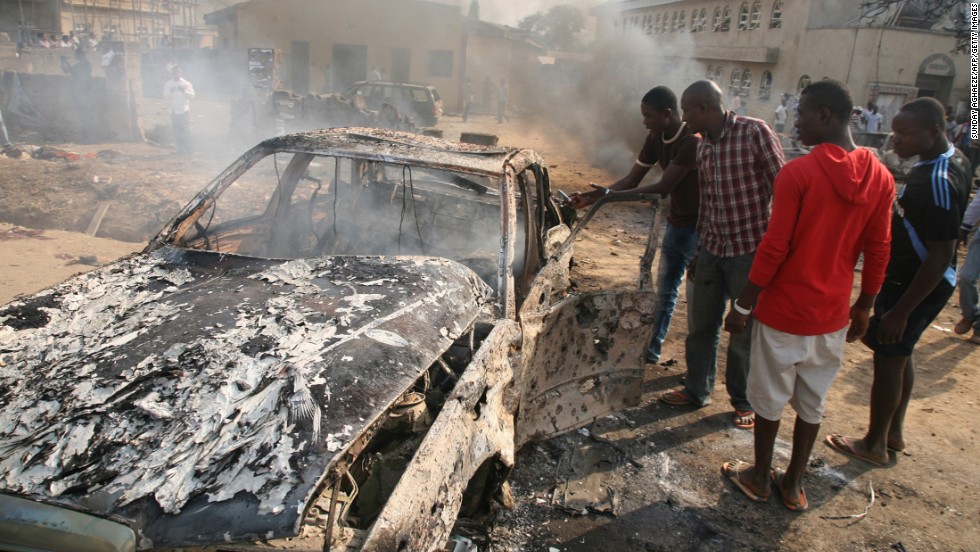
22 photos: Boko Haram: Nigeria's crisis
Men look at the wreckage of a car after a bomb blast at St. Theresa Catholic Church outside Abuja on December 25, 2011. A string of bombs struck churches in five Nigerian cities, leaving dozens dead and wounded on the Christmas holiday, authorities and witnesses said. Boko Haram's targets included police outposts and churches as well as places associated with "Western influence."
Hide Caption
8 of 22
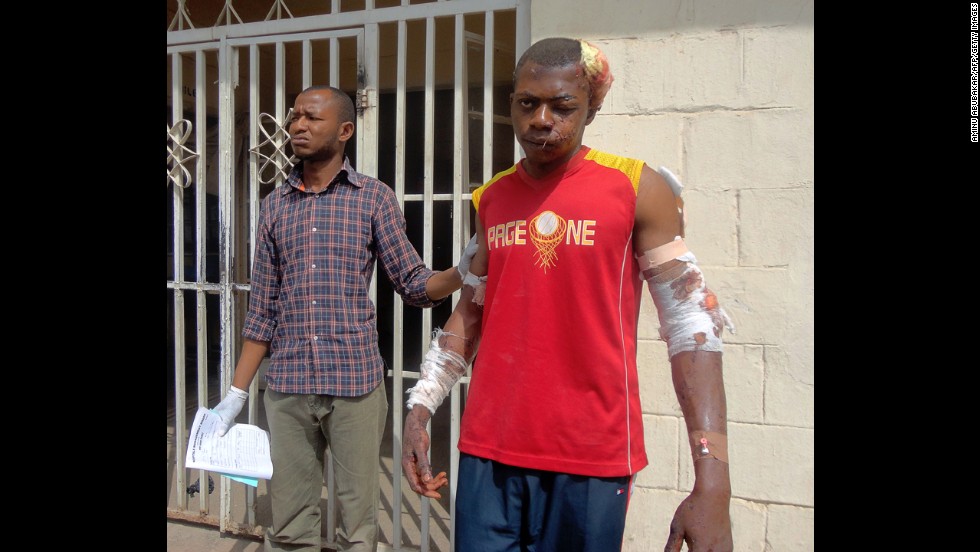
22 photos: Boko Haram: Nigeria's crisis
A paramedic helps a young man as he leaves a hospital in the northern Nigerian city of Kano on January 21, 2012. A spate of bombings and shootings left more than 200 people dead in Nigeria's second-largest city. Three days later, a joint military task force in Nigeria arrested 158 suspected members of Boko Haram.
Hide Caption
9 of 22
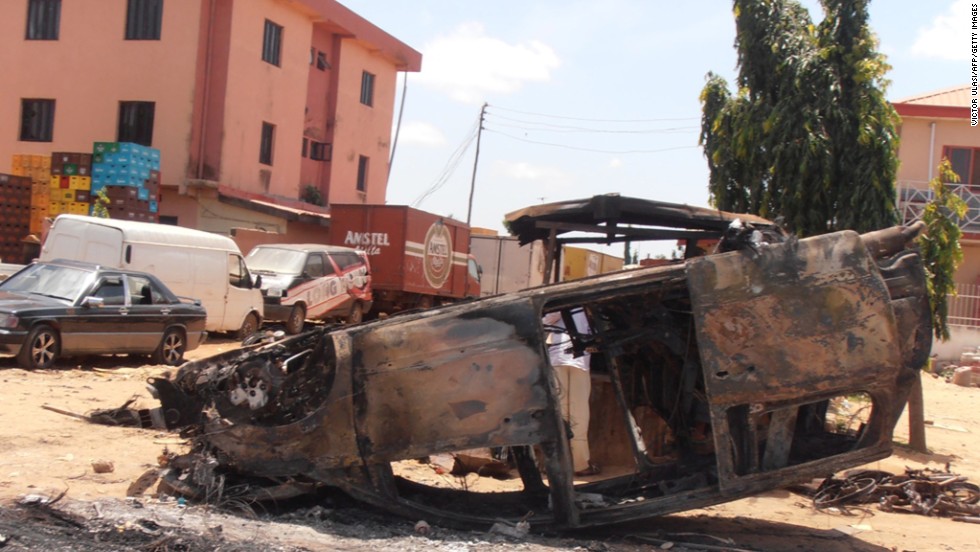
22 photos: Boko Haram: Nigeria's crisis
A photo taken on June 18, 2012, shows a car vandalized after three church bombings and retaliatory attacks in northern Nigeria killed at least 50 people and injured more than 130 others, the Nigerian Red Cross Society said.
Hide Caption
10 of 22
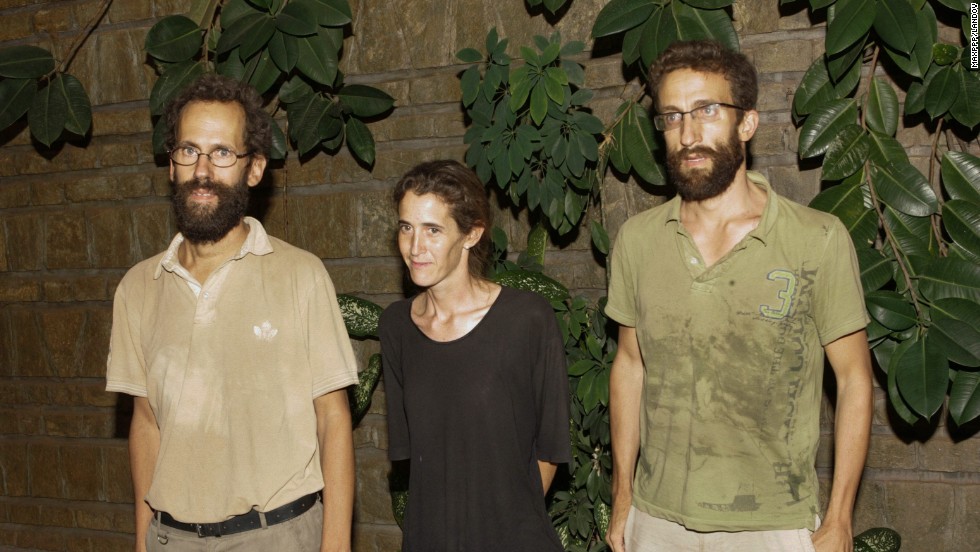
22 photos: Boko Haram: Nigeria's crisis
A French family kidnapped February 19, 2013, in northern Cameroon is released after two months in captivityin Nigeria. The family of four children, their parents and an uncle were kidnapped in Waza National Park in northern Cameroon, situated near the border with Nigeria. One of the captive men read a statement demanding that Nigeria and Cameroon free jailed members of Boko Haram.
Hide Caption
11 of 22
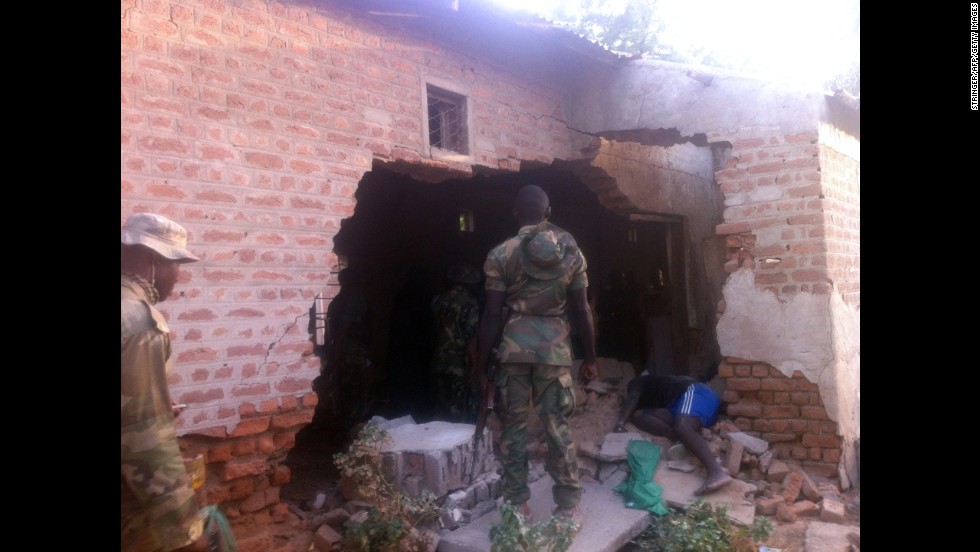
22 photos: Boko Haram: Nigeria's crisis
A soldier stands in front of a damaged wall and the body of a prison officer killed during an attack on a prison in the northeastern Nigerian town of Bama on May 7, 2013. Two soldiers were killed during coordinated attacks on multiple targets. Nigeria's military said more than 100 Boko Haram militants carried out the attack.
Hide Caption
12 of 22

22 photos: Boko Haram: Nigeria's crisis
A deserted student hostel is shown on August 6, 2013, after gunmen stormed a school in Yobe state, killing 20 students and a teacher, state media reported.
Hide Caption
13 of 22

22 photos: Boko Haram: Nigeria's crisis
A photograph made available by the Nigerian army on August 13, 2013, shows improvised explosive devices, bomb-making materials and detonators seized from a Boko Haram hideout. Gunmen attacked a mosque in Nigeria with automatic weapons on August 11, 2013, killing at least 44 people.
Hide Caption
14 of 22

22 photos: Boko Haram: Nigeria's crisis
Nigerian students from Jos Polytechnic walk on campus in Jos, Nigeria, on September 30, 2013. Under the cover of darkness, gunmen approached a college dormitory in a rural Nigerian town and opened fire on students who were sleeping. At least 40 students died, according to the News Agency of Nigeria.
Hide Caption
15 of 22

22 photos: Boko Haram: Nigeria's crisis
Soldiers stand outside the 79 Composite Group Air Force base that was attacked earlier in Maiduguri on December 2, 2013. Hundreds of Boko Haram militants attacked an Air Force base and a military checkpoint, according to government officials.
Hide Caption
16 of 22

22 photos: Boko Haram: Nigeria's crisis
Catholic priest Georges Vandenbeusch speaks to reporters outside Paris after his release on January 1, 2014. Vandenbeusch was snatched from his parish church in Cameroon on November 13. Boko Haram claimed responsibility for kidnapping the priest.
Hide Caption
17 of 22

22 photos: Boko Haram: Nigeria's crisis
A man receives treatment at Konduga specialist hospital after a gruesome attack on January 26, 2014. It was suspected that Boko Haram militants opened fire on a village market and torched homes in the village of Kawuri, killing at least 45 people.
Hide Caption
18 of 22

22 photos: Boko Haram: Nigeria's crisis
Police officers stand guard in front of the burned remains of homes and businesses in the village of Konduga on February 12, 2014. Suspected Boko Haram militants torched houses in the village, killing at least 23 people, according to the governor of Borno state on February 11.
Hide Caption
19 of 22

22 photos: Boko Haram: Nigeria's crisis
Yobe state Gov. Ibrahim Gaidam, left, looks at the bodies of students inside an ambulance outside a mosque in Damaturu. At least 29 students died in an attack on a federal college in Buni Yadi, near the capital of Yobe state, Nigeria's military said on February 26, 2014. Authorities suspect Boko Haram carried out the assault in which several buildings were also torched.
Hide Caption
20 of 22

22 photos: Boko Haram: Nigeria's crisis
Rescue workers try to put out a fire after a bomb exploded at the busiest roundabout near the crowded Monday Market in Maiduguri on July 1, 2014.
Hide Caption
21 of 22

22 photos: Boko Haram: Nigeria's crisis
Police in riot gear block a route in Abuja on October 14, 2014, during a demonstration calling on the Nigerian government to rescue schoolgirls kidnapped by Boko Haram. In April, more than 200 girls were abducted from their boarding school in northeastern Nigeria, officials and witnesses said.
Hide Caption
22 of 22

22 photos: Boko Haram: Nigeria's crisis
A video of Abubakar Shekau, who claims to be the leader of the Nigerian Islamist extremist group Boko Haram, is shown in September 2013. Boko Haram is an Islamist militant group waging a campaign of violencein northern Nigeria. The group's ambitions range from the stricter enforcement of Sharia law to the total destruction of the Nigerian state and its government. Click through to see recent bloody incidents in this strife-torn West African nation:
Hide Caption
1 of 22

22 photos: Boko Haram: Nigeria's crisis
Hide Caption
2 of 22

22 photos: Boko Haram: Nigeria's crisis
Bodies lie in the streets in Maiduguri, Nigeria, after religious clashes on July 31, 2009. Boko Haram exploded onto the national scene in 2009 when 700 people were killed in widespread clashes across the north between the group and the Nigerian military.
Hide Caption
3 of 22

22 photos: Boko Haram: Nigeria's crisis
An official displays burned equipment inside a prison in Bauchi, Nigeria, on September 9, 2010, after the prison was attacked by suspected members of Boko Haram two days earlier. About 720 inmates escaped during the prison break, and police suspect the prison was attacked because it was holding 80 members of the sect.
Hide Caption
4 of 22

22 photos: Boko Haram: Nigeria's crisis
Nigerian President Goodluck Jonathan, second from left, stands on the back of a vehicle after being sworn-in as President during a ceremony in the capital of Abuja on May 29, 2011. In December 2011, Jonathan declared a state of emergency in parts of the country afflicted by violence from Boko Haram.
Hide Caption
5 of 22

22 photos: Boko Haram: Nigeria's crisis
Rescue workers help a wounded person from a U.N. building in Abuja, Nigeria, on August 26, 2011. The building was rocked by a bomb that killed at least 23 people, leaving others trapped and causing heavy damage. Boko Haram had claimed responsibility for the attack in which a Honda packed with explosivesrammed into the U.N. building, shattering windows and setting the place afire.
Hide Caption
6 of 22

22 photos: Boko Haram: Nigeria's crisis
A photo taken on November 6, 2011, shows state police headquarters burned by a series of attacks that targeted police stations, mosques and churches in Damaturu, Nigeria, on November 4, 2011. Attackers left scores injured -- probably more than 100 -- in a three-hour rampage, and 63 people died.
Hide Caption
7 of 22

22 photos: Boko Haram: Nigeria's crisis
Men look at the wreckage of a car after a bomb blast at St. Theresa Catholic Church outside Abuja on December 25, 2011. A string of bombs struck churches in five Nigerian cities, leaving dozens dead and wounded on the Christmas holiday, authorities and witnesses said. Boko Haram's targets included police outposts and churches as well as places associated with "Western influence."
Hide Caption
8 of 22

22 photos: Boko Haram: Nigeria's crisis
A paramedic helps a young man as he leaves a hospital in the northern Nigerian city of Kano on January 21, 2012. A spate of bombings and shootings left more than 200 people dead in Nigeria's second-largest city. Three days later, a joint military task force in Nigeria arrested 158 suspected members of Boko Haram.
Hide Caption
9 of 22

22 photos: Boko Haram: Nigeria's crisis
A photo taken on June 18, 2012, shows a car vandalized after three church bombings and retaliatory attacks in northern Nigeria killed at least 50 people and injured more than 130 others, the Nigerian Red Cross Society said.
Hide Caption
10 of 22

22 photos: Boko Haram: Nigeria's crisis
A French family kidnapped February 19, 2013, in northern Cameroon is released after two months in captivityin Nigeria. The family of four children, their parents and an uncle were kidnapped in Waza National Park in northern Cameroon, situated near the border with Nigeria. One of the captive men read a statement demanding that Nigeria and Cameroon free jailed members of Boko Haram.
Hide Caption
11 of 22
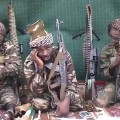





















Story highlights
- Most of the victims were at a mosque targeted during evening prayers
- Suicide bombers strike in and around Maiduguri in northeastern Nigeria
- The region has been plagued for years by the Islamist extremist group Boko Haram
(CNN)A series of suicide bombings in and around the northern Nigerian city of Maiduguri has killed 34 people, most of them at a mosque that was targeted during evening prayers, the National Emergency Management Agency said Friday.
The agency said a total of 49 people were wounded. There has been no claim of responsibility.
The first bombing happened Thursday evening as worshippers gathered at a mosque for evening prayers. According to Mohammed Kanar, the coordinator for NEMA in northeast Nigeria, residents said the bomber entered the mosque disguised as a worshipper and set off his explosives inside, killing 14 people.
A second bomber was waiting outside, and as residents and first responders rushed to the scene, he blew himself up and killed 16 people, Kanar said.
The bombs wounded 32 people, seven of whom were in critical condition.
Friday morning, three women carried out separate suicide bombings in Umarari Bayan Waya, on the outskirts of Maiduguri, Kanar said. Four people were killed and 17 wounded.
Maiduguri ridden by violence
The capital of Borno state, Maiduguri has been beset for years by such bloody attacks, which have been supported, planned and carried out by members of Boko Haram.
The Islamist extremist group has shown no mercy in its quest to impose its strict version of Sharia law across Nigeria, which is split between a majority Muslim north and a mostly Christian south.
While it wasn't immediately known whether Boko Haram is to blame for the five suicide bombings, such attacks would be consistent with its grisly past -- one that shows little apparent distinction between killing innocent civilians or uniformed officers and troops.
The group has killed hundreds in attacks on many civilian targets like marketplaces, churches and mosques. It has also conducted mass kidnappings, the most notorious being the abduction of more than 200 girls last year from a school in the northeastern city of Chibok. The girls' fate remains a mystery.


Comments